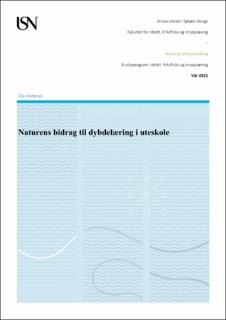| dc.contributor.advisor | Haukeland, Per Ingvar | |
| dc.contributor.author | Hellenes, Ola | |
| dc.date.accessioned | 2021-07-20T16:12:25Z | |
| dc.date.available | 2021-07-20T16:12:25Z | |
| dc.date.issued | 2021 | |
| dc.identifier | no.usn:wiseflow:2575486:42385690 | |
| dc.identifier.uri | https://hdl.handle.net/11250/2764822 | |
| dc.description.abstract | Denne masteroppgaven tar for seg naturens bidrag til dybdelæring i uteskole og hva slags didaktisk kompetanse læreren trenger for å utforske naturens bidrag. Et aksjonsforskningsprosjekt ble gjennomført ved en barneskole med uteskole-undervisning en full dag i uka over en periode på 10 uker for å se hvordan relasjonen til naturen kunne bidra til dybdelæring i planleggingen og gjennomføringen av undervisningen.
Teorien som brukes i oppgaven tar utgangspunkt i John Deweys pragmatiske læringsteorier, en økopedagogisk tilnærming til didaktikken, og et økologisk fenomenologisk perspektiv gjennom Tim Ingold. I tillegg utgjør begrepsavklaringer og noen perspektiver fra kunnskapsløftet 2020 en del av grunnlaget for oppgaven.
forbindelse med uteskole-dagene ble det utarbeidet planer og skrevet feltnotater som utgjør empirien. Resultatene ifra aksjonsforskningen blir presentert ved bruk av den didaktiske relasjonsmodellen som analyseverktøy, hvor ulike situasjoner som oppstod i perioden trekkes fram for å belyse problemstillingene. Hovedtrekk fra empirien diskuteres deretter, og leder ut i noen forståelser av tematikken.
Undersøkelsen viser at naturen bidrar i alle deler av undervisningen, og jeg foreslår at forholdet til naturen i uteskole best forstås relasjonelt. Jeg foreslår at den didaktiske relasjonsmodellen bør integrere naturen som en sentral kategori i arbeidet med uteskole, i det som kan kalles en økodidaktisk relasjonsmodell. Avhandlingen viser at innganger til fagstoff i møte med naturen kan beskrives som enten en oppmerksom induktiv inngang, eller en kreativ deduktiv inngang. Til slutt foreslås en økodidaktisk pyramide, som en utvikling av den didaktiske trekant, som tar hensyn til naturen som læringsmiljø. Den økodidaktiske pyramiden illustrerer hvordan naturen kan bidra til dybdelæring i uteskole.
Nøkkelord: uteskole, dybdelæring, økodidaktikk, naturens bidrag, naturen som læringsmiljø, naturrelasjon. | |
| dc.description.abstract | This master thesis is dealing with nature’s contribution towards deep learning in outdoor education, and what kind of didactic competence is needed for the teacher when discovering nature’s contribution to deep learning. An action research project was executed in a primary school with one day of teaching outdoor education every week, during a period of 10 weeks.
Important theory in the thesis is John Deweys pragmatic pedagogy (Dewey, 1916), and an ecodidactic approach to teaching based on Bjørn Bjørndalen and Sigmund Lieberg’s work from 1975 (Bjørndal & Lieberg, 1975). An ecologic phenomenological perspective grounded in Tim Ingold’s work is also central in the understanding of nature’s contribution to deep learning (Ingold, 2011; Ingold, 2015; Ingold, 1997).
In the course of the project teaching plans where made and field-notes written. The empiric data consists of the plans and fieldnotes. The results are presented by using the didactic relation model developed by Bjørndalen and Lieberg (1975) as a tool for analysis. The model consists of different categories for teaching, such as: contents, goals, learning framework, methods and evaluation. Different situations are categorized and analyzed to shed light on the issues of concern in the thesis.
The findings suggests that the nature actively contributes in relation to every part of the planning and teaching itself. I suggest that a wider understanding of the didactic relation model, where nature is integrated as a central category in the middle, can be a useful approach to didactic work in outdoor education. The findings suggest two ways of connecting subject matter to nature: 1) an attentive inductive way, where the focus is on finding connections in the nature that are already present, and 2) an creative deductive way, where the focus is on creating connections to subject matter in relation to the nature. I also discuss different ways of using subject matter and activity when teaching in outdoor education. I suggest that activity and subject matter should be integrated in order to reach the goal of deep learning. A development of the didactic triangle is also suggested, into a ecodidactic pyramid, where nature is included in the model to form a three-dimensional pyramid that allows learning processes to go deep.
Keywords: outdoor education, deep learning, ecodidactics, nature’s contribution. | |
| dc.language | nob | |
| dc.publisher | University of South-Eastern Norway | |
| dc.title | Naturens bidrag til dybdelæring i uteskole | |
| dc.type | Master thesis | |
